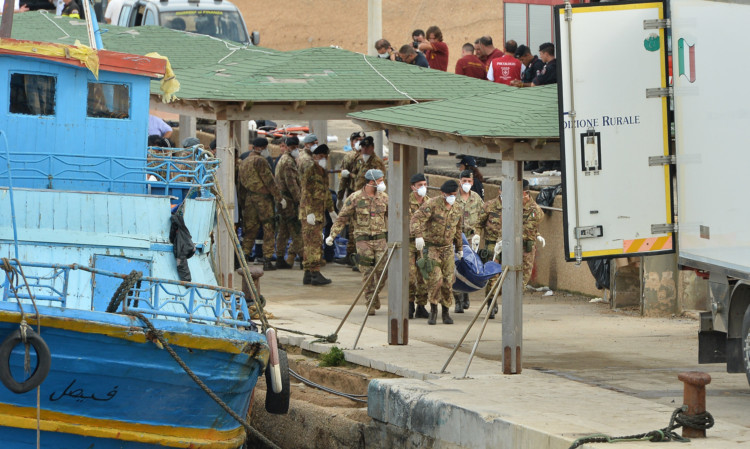Pairs of divers have searched calmer seas off the Italian island of Lampedusa in a bid to recover the corpses of would-be asylum seekers who died when a fishing boat packed with 500 African migrants capsized within sight of land.
By nightfall, 83 bodies had been retrieved, including one child, raising the official death toll to 194. About 150 more are believed to still be missing, many likely trapped in the wreckage 154ft (47m) below the surface.
The enormous scale of the tragedy, which could become the largest death toll in a migrant shipwreck in the Mediterranean on record, has created momentum for a comprehensive European Union immigration policy to cope with the tens of thousands fleeing misery and strife in Africa and the Middle East.
“The Mediterranean cannot remain a huge cemetery under the open skies,” French foreign minister Laurent Fabius said on French TV station iTele.
Mr Fabius said France and Italy have asked that the issue be placed on the agenda of an EU interior ministers’ meeting on Tuesday. On Wednesday, European Commission president Jose Manuel Barroso plans to visit the island, Italy’s southernmost point and a frequent destination for migrants trying to reach a safe haven. Tens of thousands arrive there each year seeking refugee status in Europe.
Nearly all of the 155 survivors of Thursday’s tragedy remain at the island’s refugee centre.
The survivors – the vast majority of them men – stayed in small groups in one corner of the yard, working together to remember the names of the people who had perished so the bodies can be identified. Forty-one are minors between the ages of 11 and 17. Most, if not all of the migrants on the boat, came from Eritrea.
“The dynamics of the shipwreck are not completely known, but it is clear many women did not make it. They nearly all died,” said Filippo Ungaro of Save the Children. To date, 55 of the 194 dead are women, and five are small children.
Italy’s Congolese-born integration minister, Cecile Kyenge, watched in silence as soldiers transferred body bags from boats onto trucks to bring to a makeshift morgue.
“There are no words in front of the dead,” Ms Kyenge said. “They are difficult moments that make us face our responsibilities.”
She said it was time for reflection “to prevent new tragedies” and said Italy could not deal with the migrant flows alone.
Earlier, she visited the survivors in the migrant centre, calling the conditions “shameful”. Many migrants, including the survivors of the shipwreck, are sleeping on mattresses in the open because of overcrowding: the centre is built for 250 and is now housing more than 1,000 people, including migrants from Somalia and Syria.
A thunderstorm struck before dawn yesterday, sending them scrambling for cover under tarps or in buses, Mr Ungaro said. While the centre is supposed to be a place of transit, many wind up there for weeks and the bathrooms and showers are not adequate for the present population. “The conditions are not acceptable. It isn’t worthy,” he said.
Laura Boldrini, the speaker of Italy’s lower house who led a parliamentary delegation to Lampedusa, said the migrants who are reaching Europe’s shores now are by and large asylum seekers, not economic migrants, as has been the case in the past.
The problem, she said, needs to be addressed in part at the countries of origin, now increasingly Syria, Somalia and Eritrea, to seek political solutions to conflicts behind the exoduses and the countries of transit, like Libya and Tunisia, so systems are constructed allowing asylum seekers to make their applications without facing perilous sea journeys.
She also said European countries need to align their immigration policies, noting that punitive policies, like Italy’s law charging migrants with illegal immigration, will not act as a deterrent.
“How can we let asylum-seekers die in the sea,” she said. “Something has to change to give sense to this emotion. Otherwise, all of this doesn’t have any sense.”
Mr Fabius said Europe must boost development aid to countries from where migrants depart and maritime borders must be better controlled, including by EU agency Frontex, in charge of border management.
He also said traffickers must be severely sanctioned, adding: “Those people make their fortunes from deaths.”
